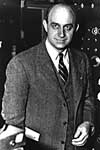Why NExT?
The UK has so far taken a pivotal role, at both European and world level, in assisting the creation of an effective community working on Monte Carlo (MC) data simulation to model the real data eventually emerging at the LHC (for example, through the creation of computing programs of MC event generation). However, it is fair to also say that more often than not theorists would simply pass on to experimentalists their MC tools, with very little further collaborative work.It is now high time for the UK to make provisions in order to show a distinctive edge in the context of real data analyses in view of the LHC. These will require a close, almost day-to-day interaction between theorists and experimentalists, working together on the discovery process of new physics. There is a need to create a viable model of these interactions that will make the most of actual LHC data and that the UK can export on the European and world stage.
(Here is a relevant quote from the “Towards the European strategy for particle physics: the Briefing Book”, hep-ph/0609216.)
We believe that such a new model of interactions between experimentalists and theorists ought to be put in place soon due to the vast amount of unprecedentedly complicated data forthcoming at the CERN machine. The NExT institute is aiming at providing the environment where such interactions can take place, by linking each of the SHEP, RHUL and Sussex theorists to one of the experiments at the LHC (and not only) represented in RAL-PPD, RHUL and Sussex. Subject to the collaboration's approval, Fellows, PDRAs and long term NExT visitors will also be encouraged to engage in this kind of activity.
In addition to
individual relationships between the participating members in
the NExT Institute, joint seminar meetings occur once a term at the
various nodes, involving the entire Institute. See
here
for Southamton-RAL meetings preceding the formal inception of the NExT Institute (in 2006).
Subsequent (formally NExT) Seminar Meetings are always found at
this page.

“There were experimentalists, there were theorists and there was Fermi”
(Roger Hildebrand, Samuel K. Allison Distinguished Service Professor in Physics, Chicago University)
![[NExT]](images/next_logo_small.png)